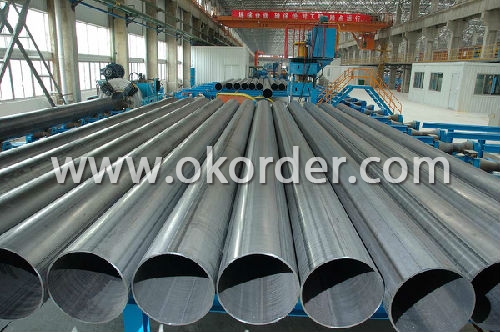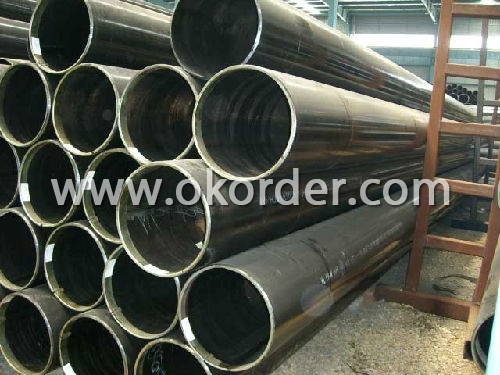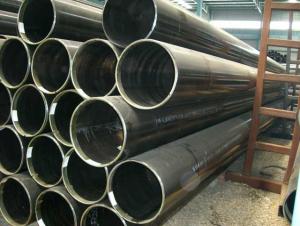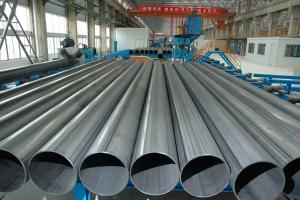ASTM 53 ERW welded pipes--Tube and Pipe
- Loading Port:
- China Main Port
- Payment Terms:
- TT or L/C
- Min Order Qty:
- 20MT m.t.
- Supply Capability:
- Based on order m.t./month
OKorder Service Pledge
OKorder Financial Service
You Might Also Like
Specifications of ASTM 53 ERW welded pipes--Tube and Pipe:
Standard:
API SPEC 5L, API SPEC 5CT, ASTM A53, GB/T9711.1
Steel Grade:
API SPEC 5L: B, X42, X46, X52, X56, X60, X65
API SPEC 5CT: J55, K55, N80, L80-1
ASTM A53: A, B, C
GB/T9711.1:L242、L290、L320、L360、L390、L415、L450
Usage/Application of ASTM 53 ERW welded pipes--Tube and Pipe:
It is widely applied to line pipe and casing and tubing in oil transportation and casing field, and it is used in low,high pressure liquid and gassy transportation and it is also good structure pipe (for furniture, window, door, building , bridge, mechanical etc).
Packaging of ASTM 53 ERW welded pipes--Tube and Pipe:
Bundles with anti-rust painting and with plastic caps


- Q:What is the difference between steel pipes and fiberglass-reinforced pipes?
- Steel pipes are made from a durable and strong material known as steel, which provides high strength and resistance to corrosion. On the other hand, fiberglass-reinforced pipes are made from a combination of fiberglass and resin, offering a lightweight and corrosion-resistant alternative. While steel pipes are commonly used for heavy-duty applications such as oil and gas pipelines, fiberglass-reinforced pipes are often preferred for applications that require resistance to chemicals and high temperatures, like in the chemical industry. Additionally, fiberglass-reinforced pipes have the advantage of being non-conductive, making them suitable for certain electrical applications.
- Q:How are steel pipes used in transportation?
- Steel pipes are commonly used in transportation for various purposes. They are used in the construction of pipelines for transporting fluids, such as oil, gas, and water, over long distances. Steel pipes are also utilized in the manufacturing of vehicle components, including exhaust systems, chassis, and suspension parts. Additionally, steel pipes can be found in infrastructure projects like bridges and tunnels, providing structural support for transportation networks.
- Q:Can steel pipes be used in extreme weather conditions?
- Steel pipes are suitable for use in extreme weather conditions because they are known for their high strength and durability. This makes them applicable in construction, infrastructure, and transportation. Steel pipes are commonly used to transport fluids and gases across industries and are specifically designed to withstand harsh environmental conditions such as extreme temperatures, high pressures, and corrosive environments. Even in extreme weather conditions like intense heat, cold, or heavy rain, steel pipes can maintain their structural integrity and functionality. Moreover, they can be coated or insulated to provide extra protection against corrosion and maintain desired temperatures. In conclusion, steel pipes are a dependable option for extreme weather conditions due to their strength, durability, and ability to resist various environmental factors.
- Q:How are steel pipes used in the telecommunications network infrastructure?
- Steel pipes have a wide range of applications within the telecommunications network infrastructure. Underground cable conduits are one of the main uses of steel pipes in this industry. These conduits are responsible for safeguarding telecommunications cables from various external factors, including moisture, rodents, and physical damage. By providing exceptional strength and durability, steel pipes ensure the long-term protection of these cables. Furthermore, steel pipes are indispensable in the construction of telecom towers and antenna masts. These structures must possess robustness and resilience to withstand adverse weather conditions. Steel pipes offer the necessary strength, stability, and durability required for telecom towers to support antennas and other equipment. Additionally, their ease of assembly enables efficient deployment and maintenance of the network infrastructure. Additionally, steel pipes are crucial in the installation of fiber optic cables. Fiber optic cables transmit data at high speeds through the use of light signals. To ensure optimal performance, it is imperative to protect these cables from any external interference. Steel pipes serve as conduits for fiber optic cables, effectively shielding them from electromagnetic interference and other potential disruptions. To summarize, steel pipes play a vital role in the telecommunications network infrastructure. They are utilized for the installation of underground cable conduits, construction of telecom towers, and protection of fiber optic cables. The strength, durability, and versatility of steel pipes make them an ideal choice for guaranteeing the reliability and functionality of telecommunications systems.
- Q:What is the outer diameter and wall thickness of the welded steel pipe of national standard DN250?
- DN250 is the nominal diameter, the outer diameter of the steel pipe is 273mm, the thickness is above 6.5mm.
- Q:Can steel pipes be used for underground water lines?
- Yes, steel pipes can be used for underground water lines.
- Q:What are the factors to consider when selecting a steel pipe for a specific application?
- When selecting a steel pipe for a specific application, several factors need to be considered. These include the type of fluid or gas being transported, the pressure and temperature conditions, the size and dimensions required, the desired corrosion resistance, and the overall budget for the project. It is also crucial to assess the pipe's material properties, such as its strength, ductility, and toughness, to ensure it can withstand the operational demands of the application. Additionally, factors like the pipe's manufacturing process, compatibility with joining methods, and any specific industry standards or regulations should be taken into account.
- Q:What are the different types of expansion joints used with steel pipes?
- There are several types of expansion joints used with steel pipes, including bellows expansion joints, universal expansion joints, hinged expansion joints, and gimbal expansion joints. These expansion joints are designed to accommodate the movement and thermal expansion of steel pipes, ensuring their integrity and preventing damage.
- Q:How are steel pipes used in petrochemical plants?
- Steel pipes are widely used in petrochemical plants for various applications including transportation of fluids such as oil, gas, and chemicals. They are used to connect different components of the plant, such as pumps, tanks, and vessels, allowing for the efficient and safe movement of these substances. Steel pipes in petrochemical plants are designed to withstand high pressure and extreme temperatures, ensuring the reliability and durability of the entire system.
- Q:Are steel pipes suitable for wastewater treatment plants?
- Indeed, wastewater treatment plants find steel pipes to be a suitable option. Their exceptional strength and durability make them a prevalent choice in this field. The ability to endure high pressure and resist corrosion renders them highly suitable for transporting wastewater and various fluids within the challenging environments of treatment plants. Moreover, the ease of welding and joining steel pipes allows for flexibility in designing and installing the piping system. All in all, steel pipes prove to be a dependable and economical selection for wastewater treatment plants.
1. Manufacturer Overview |
|
|---|---|
| Location | Tianjin, China |
| Year Established | 1997 |
| Annual Output Value | Above Three Million To Five Million RMB |
| Main Markets | Main land |
| Company Certifications | ISO 9001:2010;API 5L; |
2. Manufacturer Certificates |
|
|---|---|
| a) Certification Name | |
| Range | |
| Reference | |
| Validity Period | |
3. Manufacturer Capability |
|
|---|---|
| a)Trade Capacity | |
| Nearest Port | Tianjin |
| Export Percentage | 40% - 50% |
| No.of Employees in Trade Department | 300-500 People |
| Language Spoken: | English; Chinese |
| b)Factory Information | |
| Factory Size: | 40,000 square meters |
| No. of Production Lines | Above 10 |
| Contract Manufacturing | OEM Service Offered; Design Service Offered |
| Product Price Range | Average |
Send your message to us
ASTM 53 ERW welded pipes--Tube and Pipe
- Loading Port:
- China Main Port
- Payment Terms:
- TT or L/C
- Min Order Qty:
- 20MT m.t.
- Supply Capability:
- Based on order m.t./month
OKorder Service Pledge
OKorder Financial Service
Similar products
New products
Hot products
Related keywords





























